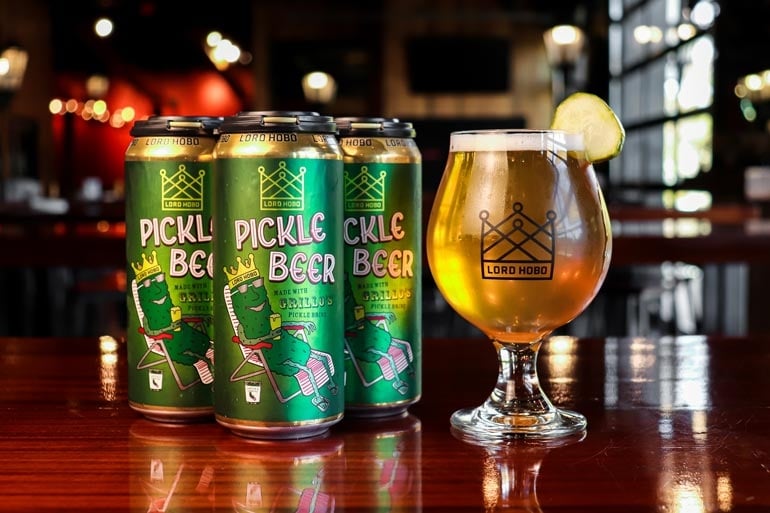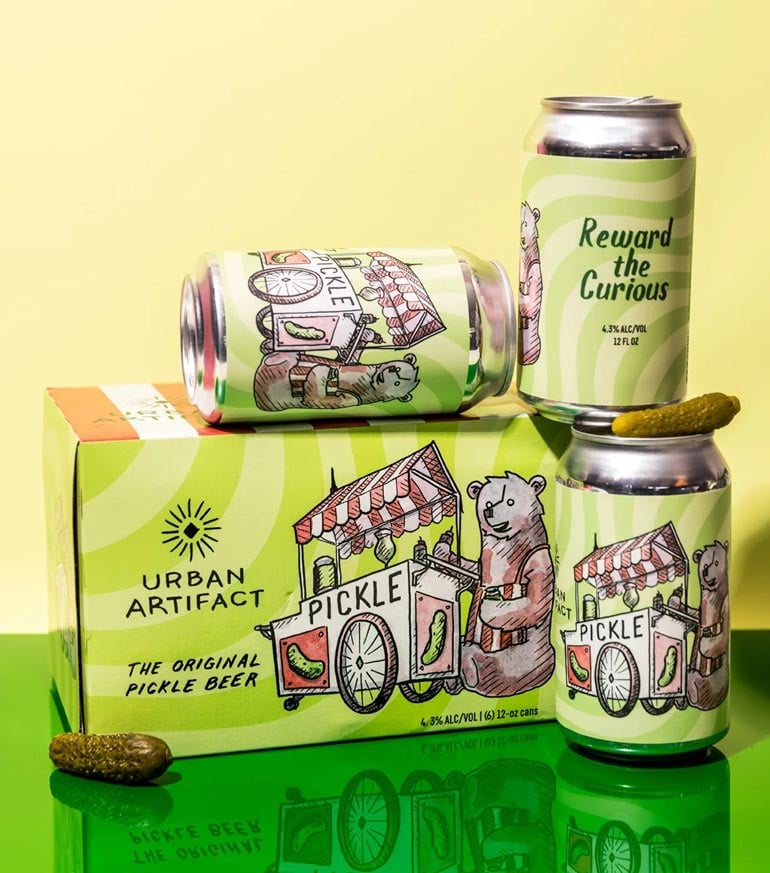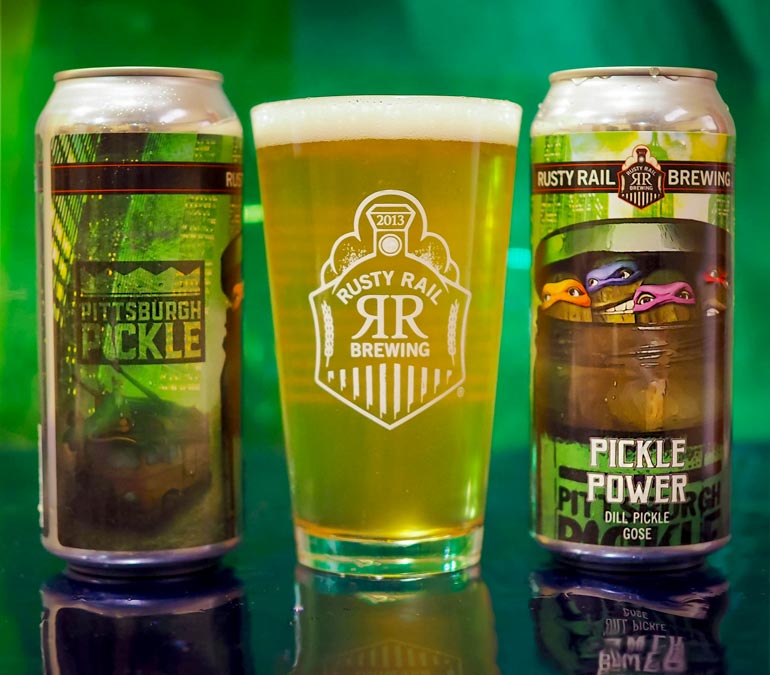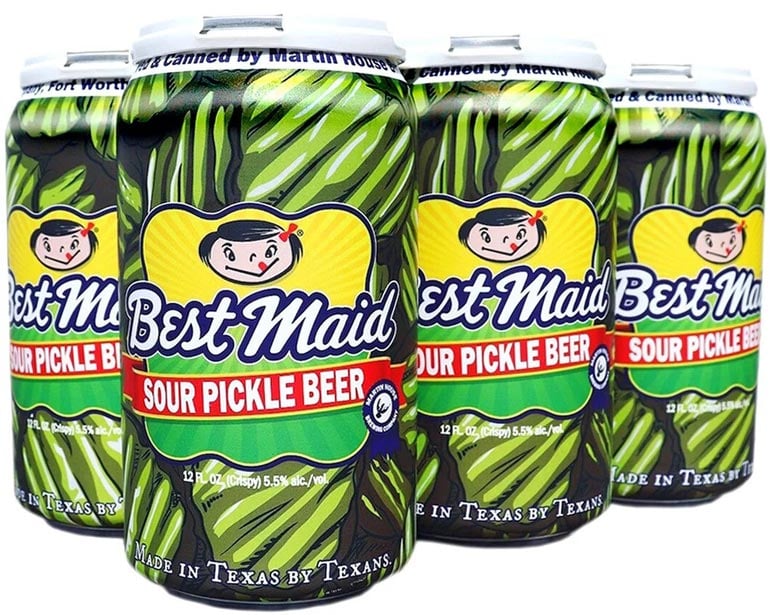Start 14-Day Trial Subscription
*No credit card required

Pickle Beer: What's The Dill?
Pickle beer has become a popular drink, but what makes it so unique? From its tangy flavor to its potential health benefits, here is everything you need to know about pickle beer.
Get ready to embark on a flavorful journey as we explore the unique and tangy world of pickle beer. Pickle beer, the unexpected marriage of brine and brew, has emerged as a fascinating trend in the world of craft beverages. This unconventional concoction brings together the crisp tanginess of pickles with the effervescence of beer to create a sensory experience like no other.
Here, we will cover everything about pickle beer including its definition, origins, production process, health benefits, pairing suggestions, popular brands, varieties/types, a recipe to prepare at home, controversies, criticisms and FAQs. Whether you are a beer enthusiast or just curious about pickle beers, this guide has all the juicy details on the latest trend in craft brewing.
Pickle beers are something of an acquired taste. You might love them, or you might hate them (just look at the rating of Best Maid Pickle Beer in our Official Review), but you'll always be entertained. To me, pickle beers are terrific (if done well), but are best suited to sour beer styles that can accentuate their zesty flavors. However, I think most things are better in beer form, so that might affect my opinion on that!
What Is Pickle Beer?
Pickle beer, a distinctive beverage gaining traction in the craft brewing scene, represents an innovative fusion of traditional brewing with the tangy essence of pickles.
Typically crafted by infusing the beer with pickle juice during the brewing process, the end result is a tantalizing blend that intrigues the taste buds. The trend has garnered attention for its ability to balance savory and hoppy elements to create a beverage that appeals to adventurous palates.
Breweries across the globe are experimenting with various pickle varieties, spices and brewing techniques to offer a diverse range of pickle beers.
As the trend continues to grow, pickle beer stands as a testament to the creativity and boundary-pushing spirit within the craft brewing community.
Origins Of Pickle Beer
The origins of pickle beer can be traced back to the 20th century when the intersection of culinary exploration and craft brewing innovation sparked the inception of this unique beverage. While early instances cannot be extensively documented, the trend experienced a notable resurgence and rise to prominence in the 2000s, particularly within the United States.
In the early years of the 21st century, craft brewers, known for their penchant for pushing the boundaries of traditional brewing, began experimenting with unconventional flavor profiles. The trend's popularity in the 2000s served as a catalyst for its current widespread acclaim. Breweries across the United States embraced the concept and incorporated pickle juice into various stages of the brewing process to achieve a distinctive flavor profile.
As the craft brewing community continued to embrace and refine pickle beer recipes, the beverage carved its niche within the industry. Today, it stands as a testament to the dynamic nature of craft brewing and showcases how a seemingly unconventional combination can captivate palates and evolve into a trend.
Varieties Of Pickle Beer
Pickle-flavored beer is an emerging trend, as breweries continue to experiment with various styles and methods of incorporating pickle flavors into their brews. Here are some general types or varieties of pickle beers that are being explored:
- Sour Gose with Pickle: This style typically involves a sour gose base combined with pickle juice or other pickle flavors, such as dill pickle. The tartness of the sour beer complements the brininess of the pickles.
- Pickle-Infused Lager: Some breweries experiment with adding pickle flavors to light lagers to create a refreshing and easy-drinking beer with a subtle pickle essence.
- Pickle Brine Saison: Saisons, known for their fruity and spicy characteristics, can be enhanced with the addition of pickle brine to provide a unique twist to the traditional saison profile.
- Spicy Pickle Beer: This is a type of pickle beer where elements such as hot peppers or other spices are fused to create a beer that combines a subtle, peppery heat with the tartness of pickles.
- Pickle Radler or Shandy: Combining pickle flavors with citrusy elements in a Radler or Shandy can result in a refreshing and zesty beer that's perfect for warm weather.
- Pickle Barrel-Aged Beer: Aging beer in pickle barrels or using pickle barrels in the brewing process imparts unique flavors to the beer. The wood from the barrels and residual pickle flavors allow the breweries to add complexity to their brews.
Flavor of Pickle Beer
Pickle beer offers a distinctive tangy flavor that sets it apart from traditional brews.
The infusion of pickle juice during the brewing process imparts a briny acidity and a hint of sourness to create a refreshing and unique taste profile.
The tangy notes, complemented by the spritz of the beer's carbonation, contribute to a well-balanced and overall intriguing flavor experience.
Pairing Suggestions
When it comes to pairing pickle beer with food, you would want to consider complementary and contrasting flavors for a unique and enjoyable experience. From grilled meats to salty snacks, each recommendation is crafted to harmonize with the distinctive flavors of pickle beer.
Grilled Meats
The tangy profile of pickle beer pairs exceptionally well with grilled meats to enhance the savory and smoky notes. Try it with grilled sausages, burgers or barbecue for a delightful combination of flavors.
Spicy Foods
The briny elements of pickle beer can complement the heat of spicy dishes. Consider enjoying it with spicy tacos, buffalo wings or other zesty cuisines to balance the heat with the refreshing acidity.
Cheese Platters
Pickle beer can be paired with a variety of cheeses, especially those with a bit of tang or creaminess. You can deliciously pair it with a variety of cheeses such as sharp cheddar, gouda or feta for a harmonious blend of flavors.
Seafood Dishes
Pickle beer can be an excellent companion for seafood, and they go fantastically with grilled shrimp, oysters or fish tacos to enhance the oceanic flavors. Additionally, the combination of pickles and rice vinegar can complement the flavors of sushi to offer a refreshing contrast to the fish and soy sauce.
Salty Snacks
The tangy and salty notes of pickle beer make it an ideal partner for salty snacks. Try it with pretzels, salted nuts or popcorn for a satisfying snack pairing.
Burgers & Sandwiches
Pairing pickle beer with burgers or sandwiches, especially those with bold and hearty flavors, can create a satisfying combination. The acidity from the pickles can cut through the richness of the meat.
Vegan & Vegetarian Fare
Pair pickle beer with plant-based dishes like veggie burgers, falafel or grilled vegetables for a refreshing and flavorful combination.
How Is Pickle Beer Made?
The production of pickle beer involves a meticulous combination of traditional brewing techniques with the innovative inclusion of pickle elements. The result is a beverage that challenges and delights the palate of beer enthusiasts. Here is how pickle beer is made:
Step 1. Ingredient Selection
The process of crafting pickle beer begins with a selection of proper ingredients. Brewers typically opt for high-quality malted grains, hops and yeast.
The distinguishing factor, however, is the inclusion of pickles or pickle juice, which imparts the signature tanginess to the brew.
Step 2. Mashing
The chosen malted grains are subjected to the mashing process where they are steeped in hot water to extract fermentable sugars.
This step lays the foundation for the beer's flavor and body. Brewers take care to maintain precise temperature control to achieve the desired balance of sweetness and fermentable sugars.
Step 3. Boiling & Hop Addition
Following mashing, the wort undergoes a boiling phase where hops are introduced to impart bitterness, aroma and flavor to the beer.
The choice of hop varieties can significantly influence the final taste profile of the beer. Basically, the integration of hops complements the pickle elements to create a harmonious blend of bitterness and tang.
Step 4. Fermentation
Once the wort is prepared, yeast is added to initiate the fermentation process. Brewers can introduce pickle juice at this stage to allow the yeast to interact with the unique flavors of the pickles. The fermentation period is critical in determining the beer's alcohol content and carbonation level.
Step 5. Conditioning & Maturation
After fermentation, the beer enters a conditioning phase where it matures and develops its distinct characteristics.
This stage allows the flavors to meld and ensures a well-rounded taste. Brewers may choose to add additional pickle elements during conditioning for enhanced complexity, though, it depends on their own strategy.
Step 6. Filtration & Packaging
The final steps involve filtration to remove any sediment or impurities from the pickle beer to ensure clarity and stability.
The beer is then carefully packaged, whether in bottles, cans or kegs, ready to be enjoyed by enthusiasts eager to experience the intriguing fusion of beer and pickles.
Health Benefits Of Pickle Beer
While pickle beer is primarily enjoyed for its unique flavor profile, it is worth exploring potential health benefits associated with its key components: pickles and beer.
1. Probiotic Potential
Pickles, being fermented, can harbor probiotic bacteria that promote gut health. These beneficial microorganisms may contribute to a balanced gut microbiome to support digestion and overall well-being.
The fermentation process involved in pickle production can lead to the presence of probiotics in both the pickles and, to a lesser extent, the beer.
2. Electrolyte Replenishment
Pickles are rich in sodium, which, when consumed in moderation, can aid in electrolyte balance.
After physical activity or in warm conditions, a moderate intake of pickle beer can help replenish electrolytes lost through sweat which can potentially contribute to hydration.
3. Antioxidant Properties
Beer, especially those with darker malts, contains antioxidants like polyphenols. These compounds can help combat oxidative stress in the body.
Additionally, certain compounds found in pickles, such as those in garlic or dill, can also have antioxidant properties.
4. Potential Stress Reduction
Moderate alcohol consumption, as found in beer, has been linked to stress reduction and relaxation.
The combination of the calming effects of beer with the savory and familiar flavors of pickles can contribute to a pleasurable and stress-relieving experience for some individuals.
5. Nutrient Content
Pickles can provide essential nutrients such as vitamin K, which is important for bone health and blood clotting.
While the nutrient content in pickle beer is not as significant as in whole pickles, the inclusion of pickles can still contribute to the overall nutritional profile of the beverage.
It's crucial to approach any potential health benefits of pickle beer with moderation and mindfulness. Excessive alcohol consumption can have adverse health effects, and the sodium content in pickles should be considered, especially for individuals with certain health conditions.
How To Make Your Own Pickle Beer At Home
Making your own pickle beer at home can be a fun and creative brewing experiment. Here is a basic yet exciting pickle beer recipe to get you started.
Keep in mind that brewing beer requires careful sanitation and adherence to safety guidelines. Adjust the recipe based on your preferences and taste testing during the brewing process.
Ingredients
- 5 gallons of water
- 8 lbs of light malt extract (liquid or dry)
- 1 lb of malted barley grains
- 1 oz of Cascade hops (for bitterness)
- 1 oz of Saaz hops (for aroma)
- 1 packet of ale yeast (choose a clean and neutral strain)
- 1 to 2 cups of dill pickle juice (adjust to taste)
- 1 oz of fresh dill (optional, for added aroma)
- 1 teaspoon of pickling spices (optional, for additional flavor complexity)
Instructions
When you have those ingredients ready, follow these steps to prepare your pickle beer with ease.
1. Sanitize Equipment
Thoroughly clean and sanitize all your brewing equipment including fermenters, airlocks, siphoning tools and bottles.
2. Steep Grains
Heat 2.5 gallons of water to around 160-170°F (71-77°C). Place the malted barley grains in a grain bag and steep them in the water for about 30 minutes. It will create a flavorful base for your beer.
3. Boil & Add Extract
Now, remove the grain bag and bring the water to a boil. Add the malt extract and Cascade hops and continue boiling for 45-60 minutes while following the hopping schedule (add Saaz hops for the last 15 minutes).
4. Cool the Wort
After boiling, cool the wort quickly using a wort chiller or an ice bath and bring the temperature down to around 70°F (21°C).
5. Transfer to Fermenter & Pitch Yeast
Transfer the cooled wort to your sanitized fermenter, leaving any sediment behind. Top up with additional water to reach a total volume of 5 gallons and sprinkle the ale yeast on top of the wort before sealing the fermenter with an airlock.
7. Fermentation
Now, place the fermenter in a cool, dark area and let it ferment for about 1-2 weeks. Check the specific gravity to ensure fermentation is complete.
8. Add Pickle Juice & Optional Ingredients
Once fermentation is complete, add 1 to 2 cups of dill pickle juice to the beer. You can also add fresh dill and pickling spices for additional flavor complexity.
9. Bottle
Carefully siphon the beer into sanitized bottles and add a small amount of priming sugar to each bottle to aid carbonation.
10. Age & Carbonate
Cap the bottles and store them in a dark, cool place for 2-4 weeks to allow carbonation to develop. The longer you age the beer, the more the flavors will meld.
11. Chill & Enjoy
Once carbonated, refrigerate the bottles, and when sufficiently chilled, open and enjoy your homemade pickle beer!
Popular Pickle Beer Brands
Considering the increasing popularity of pickle beers, numerous brands have started to produce them in America. Here are a few examples of breweries that are known for producing top-notch pickle beers:
Best Maid Pickle Beer by Martin House Brewing Company (Texas)
Martin House Best Maid Pickle Beer has had significant exposure in recent times and brought success to the company. It is mainly known as "Best Maid Sour Pickle Beer," which is the result of a collaboration with Best Maid Pickles. It is a sour gose-style beer with a distinct pickle flavor that offers a unique blend of tartness. There have been various spin-off brands of this including "spicy, tropical, grape punch and more."
Pickle Power by Rusty Rail Brewing Company (Pennsylvania)
Rusty Rail Brewing Company's Pickle Power stands out as an homage to its location in a former pickle plant. This Pennsylvania-based brewery crafts a pickle-flavored beer to infuse a sense of local history into a distinctive and flavorful brew.
Donna's Pickle Beer by Pilot Project Brewing (Illinois)
Dedicated to a single pickle-flavored beer, Donna's Pickle Beer embraces a niche market for the beer industry. Partnering with Pilot Project Brewing, which is a brewery "incubator" with locations in Chicago and Milwaukee, this beautifully branded brew ships to over 40 states.
Pickle by Urban Artifact (Ohio)
Urban Artifact in Cincinnati, Ohio features a wide variety of top-flight fruited sours. But what about pickled sours? The brewery has you covered with the aptly named Pickle, which it bills as "the original pickle beer." The folks at Urban Artifact are clearly doing something right, as it was named the top Vegetable Beer of 2023 at the U.S. Open Beer Championships.
Grillo's Pickle Beer by Lord Hobo Brewing Co. (Massachusetts)
New England is home to a bevy of talented brewers and notable breweries, so it's no surprise that the region is home to a top-flight pickle beer. This offering from Woburn, Massachusetts's Lord Hobo is brewed with pickle brine from notable pickle maker Grillo's
Controversies And Criticisms Surrounding Pickle Beer
While pickle beer may appeal to adventurous beer enthusiasts, its unique flavor profile has generated some controversies and criticisms as well.
Unconventional Flavor
Pickle beer's unconventional taste, combining the tanginess of pickles with the characteristics of beer, can be polarizing. Traditionalists may find it challenging to embrace such unique and sometimes overpowering flavors in a beer.
Limited Appeal
The distinctive taste of pickle beer may limit its appeal to a niche market. Some argue that the flavor cannot resonate with a broad audience, potentially leading to a limited consumer base.
Gimmicky Nature
Critics argue that pickle beer, along with other experimental beer flavors, can sometimes be perceived as a gimmick rather than a serious exploration of brewing creativity. Some feel that breweries should focus more on novelty rather than producing high-quality and well-balanced beers.
Quality Concerns
The integration of pickle flavors into beer requires a delicate balance to ensure a pleasant drinking experience. Some critics contend that poorly executed pickle beers may result in unpalatable brews, which lead to concerns about overall quality.
Cultural Sensitivity
Pickles and their associated flavors can be culturally specific, and the use of pickle flavors in beer may be seen as appropriating or commodifying certain culinary traditions. This can lead to debates about cultural sensitivity in the brewing industry.
Health Considerations
Some individuals may have concerns about the health implications of consuming pickle beer regularly. The high sodium content in pickles, if not managed properly in the brewing process, could contribute to health concerns related to sodium intake.
Frequently Asked Questions
How much alcohol is in pickle beer?
The alcohol content in pickle beer varies by brand and style. Generally falling within the typical beer range of 4-8% alcohol by volume, it depends on the brewery's recipe and brewing process.
Are Best Maid and Del-Dixi the same?
Best Maid and Del-Dixi are separate pickle companies in the United States. Best Maid is known for its collaboration with Martin House Brewing Company to create the Best Maid Sour Pickle Beer, while Del-Dixi is another pickle brand with distinct products.
What beer goes well with pickles?
Pairing beer with pickles can be subjective, but lighter beer styles often complement the tangy and briny flavors of pickles. A crisp lager, sour beer or wheat beer can be good choices as well.
Are You Ready to Pick Up Your Pickle Beer?
Pickle beer can offer a unique and adventurous drinking experience for those looking to venture beyond traditional beer flavors. The creative combinations of tangy pickles and beer's diverse styles bring a refreshing twist to the craft beer scene.
Whether you are intrigued by the Best Maid Sour Pickle Beer or curious about other pickle-infused brews, embracing this unconventional flavor can be a delightful journey for beer enthusiasts seeking something different.
So, go ahead, grab a bottle, and savor the distinct and innovative taste of pickle beer! Cheers to the exciting world of experimental brewing!






